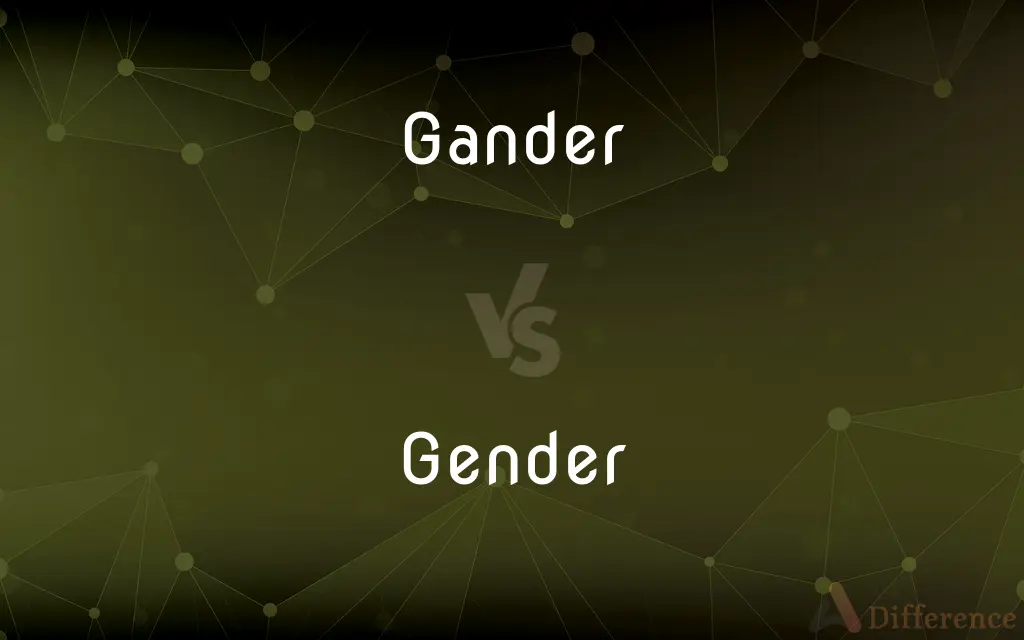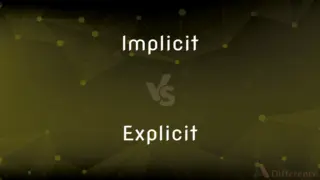Gander vs. Gender — What's the Difference?
Edited by Tayyaba Rehman — By Urooj Arif — Updated on April 24, 2024
Gander refers to a male goose, while gender pertains to the social and cultural differences between males, females, and other identities, rather than biological differences.

Difference Between Gander and Gender
Table of Contents
ADVERTISEMENT
Key Differences
Gander specifically describes an adult male goose, used primarily in zoological and avian contexts. Whereas, gender refers to roles, behaviors, and identities that societies assign to individuals, often based on their sex but distinct from biological attributes.
Gander has a straightforward, literal meaning without much variation or context dependency. On the other hand, gender is a complex concept that varies widely across different cultures and is subject to social, psychological, and political influences.
Gander is used with clear, specific biological criteria in mind primarily to distinguish between male and female geese. While gender can encompass a broad range of identities beyond just male and female, including transgender, non-binary, and genderqueer, among others.
Gander does not typically appear in discussions outside of biological or ecological contexts. In contrast, gender is a pivotal aspect of social science, human rights, and personal identity discussions, influencing various sectors including law, education, and healthcare.
Gander is purely a biological term with no inherent social implications. Whereas gender shapes and is shaped by societal norms and expectations, often influencing an individual’s life experiences and opportunities.
ADVERTISEMENT
Comparison Chart
Definition
An adult male goose
The range of characteristics pertaining to, and differentiating between, masculinity and femininity
Context of Use
Zoology, avian biology
Social sciences, culture, identity politics
Complexity
Simple and biological
Complex and socially constructed
Variability
Fixed definition
Highly variable across different cultures and individual identities
Social Implication
None
Significant, affects rights, roles, and recognition
Compare with Definitions
Gander
Zoologically specific with no gender implications.
The gander is often more aggressive during mating season.
Gender
A category that includes a range of identities such as male, female, transgender, and more.
The conference on human rights discussed gender equality extensively.
Gander
A term for an adult male goose.
The gander protected the geese as they swam in the lake.
Gender
Can be fluid and is defined by the individual.
Alex identifies as non-binary, which is outside the traditional gender norms.
Gander
Specifically denotes male geese in discussions or observations.
We spotted several ganders in the flock today.
Gender
Influences social roles and personal identity.
Her gender expression aligns more with her identity than the sex she was assigned at birth.
Gander
Used in phrases to imply a look or glance, as in 'take a gander'.
Take a gander at that spectacular view!
Gender
A subject of academic study and cultural discussion.
Gender studies explore how society constructs and perceives roles and behaviors.
Gander
Rarely used metaphorically, primarily biological.
Identifying a gander from a goose requires attention to physical differences.
Gender
Has legal and policy implications.
Gender discrimination laws seek to protect individuals from unfair treatment based on their gender.
Gander
A town on the island of Newfoundland, on Lake Gander; population 9,951 (2006). Its airport served the first regular transatlantic flights during the Second World War.
Gender
Gender is the range of characteristics pertaining to, and differentiating between, femininity and masculinity. Depending on the context, these characteristics may include biological sex, sex-based social structures (i.e., gender roles), or gender identity.
Gander
Look or glance at something
Paulie gandered at shelves full of coffee paraphernalia
Gender
Either of the two sexes (male and female), especially when considered with reference to social and cultural differences rather than biological ones. The term is also used more broadly to denote a range of identities that do not correspond to established ideas of male and female
Someone of the opposite gender
Everyone always asks which gender I identify as
A condition that affects people of both genders
Gander
A male goose.
Gender
(in languages such as Latin, French, and German) each of the classes (typically masculine, feminine, common, neuter) of nouns and pronouns distinguished by the different inflections which they have and which they require in words syntactically associated with them. Grammatical gender is only very loosely associated with natural distinctions of sex.
Gander
(Informal) A look or glance
"Everyone turns and takes a gander at the yokels" (Garrison Keillor).
Gender
The fact of being classified as belonging to such a category
Agreement in gender, number, and case.
Gander
(Informal) A simpleton; a ninny.
Gender
Either of the two divisions, designated female and male, by which most organisms are classified on the basis of their reproductive organs and functions; sex.
Gander
A male goose.
Gender
One's identity as female or male or as neither entirely female nor entirely male.
Gander
A fool, simpleton.
Gender
Females or males considered as a group
Students lined up with the genders in different lines.
Gander
A glance, look.
Have a gander at what he’s written.
I took a gander and she seemed so familiar.
Gender
To engender.
Gander
(US) A man living apart from his wife.
Gender
(obsolete) Class; kind.
Gander
Ramble, wander
Gender
(grammar) A division of nouns and pronouns (and sometimes of other parts of speech) into masculine or feminine, and sometimes other categories like neuter or common, and animate or inanimate.
Gander
The male of any species of goose.
Gender
Identification as a man, a woman, or something else, and association with a (social) role or set of behavioral and cultural traits, clothing, etc; a category to which a person belongs on this basis. Compare gender role, gender identity.
Gander
Mature male goose
Gender
Senseid|en|grammar: voice}} (grammar) {{synonym of voice
Gender
(hardware) The quality which distinguishes connectors, which may be male (fitting into another connector) and female (having another connector fit into it), or genderless/androgynous (capable of fitting together with another connector of the same type).
Gender
An Indonesian musical instrument resembling a xylophone, used in gamelan music.
Gender
(sociology) To assign a gender to (a person); to perceive as having a gender; to address using terms (pronouns, nouns, adjectives...) that express a certain gender.
Gender
(sociology) To perceive (a thing) as having characteristics associated with a certain gender, or as having been authored by someone of a certain gender.
Gender
(archaic) To engender.
Gender
To breed.
Gender
Evoking indescribable feelings regarding gender.
This song is so gender.
Gender
Kind; sort.
Gender
Sex, male or female.
Gender
To beget; to engender.
Gender
To copulate; to breed.
Common Curiosities
Why is understanding gender important?
It helps in recognizing and respecting the diverse identities and experiences of individuals, promoting equality and inclusivity.
How is gender identity different from sexual orientation?
Gender identity is about one’s personal sense of their gender, while sexual orientation is about whom one is attracted to romantically or sexually.
What does 'taking a gander' mean?
It means to take a look or glance at something.
Can gander refer to anything other than a male goose?
Colloquially, it can also mean to take a look, but its primary meaning is a male goose.
Is gender biologically determined?
Gender is socially and culturally constructed, whereas biological sex is based on physical characteristics.
What are gender norms?
These are societal rules and expectations that dictate appropriate behavior for people based on their perceived or assigned gender.
Can ganders be female?
No, gander specifically refers to male geese. Female geese are called geese.
Are there any movements focused on gender equality?
Yes, numerous global movements and organizations work towards achieving gender equality and challenging traditional gender roles.
How do societies shape gender roles?
Through cultural norms, media portrayals, legal systems, and personal interactions that reinforce what behaviors are appropriate for different genders.
What does it mean to be genderqueer?
It refers to someone who does not subscribe to conventional gender distinctions but identifies with neither, both, or a combination of male and female genders.
Is the term gander used in any scientific research?
Yes, it's used in avian biology and related research concerning geese.
Can the concept of gender vary globally?
Yes, different cultures can have varying definitions of gender roles and identities.
How can one support someone exploring their gender identity?
By being respectful, open-minded, and supportive, offering a safe space for expression and discussion.
What legal protections exist for gender discrimination?
Many countries have laws against gender discrimination, ensuring equal treatment in various aspects of life including employment, education, and healthcare.
What role does gender play in professional settings?
It can influence job roles, expectations, and salaries, often highlighted in discussions about gender parity and discrimination.
Share Your Discovery

Previous Comparison
Wide vs. Big
Next Comparison
Implicit vs. ExplicitAuthor Spotlight
Written by
Urooj ArifUrooj is a skilled content writer at Ask Difference, known for her exceptional ability to simplify complex topics into engaging and informative content. With a passion for research and a flair for clear, concise writing, she consistently delivers articles that resonate with our diverse audience.
Edited by
Tayyaba RehmanTayyaba Rehman is a distinguished writer, currently serving as a primary contributor to askdifference.com. As a researcher in semantics and etymology, Tayyaba's passion for the complexity of languages and their distinctions has found a perfect home on the platform. Tayyaba delves into the intricacies of language, distinguishing between commonly confused words and phrases, thereby providing clarity for readers worldwide.














































